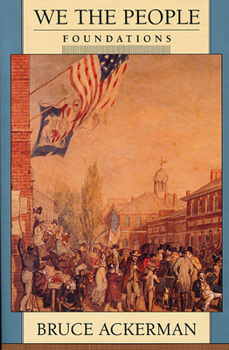Book Overview
Bruce Ackerman offers a sweeping reinterpretation of our nation's constitutional experience and its promise for the future. Integrating themes from American history, political science, and philosophy, We the People confronts the past, present, and future of popular sovereignty in America. Only this distinguished scholar could present such an insightful view of the role of the Supreme Court. Rejecting arguments of judicial activists, proceduralists,...
Format:Paperback
Language:English
ISBN:0674948416
ISBN13:9780674948419
Release Date:March 1993
Publisher:Belknap Press
Length:384 Pages
Weight:1.25 lbs.
Dimensions:1.0" x 6.1" x 9.2"
Customer Reviews
4 ratings
Must read for serious constitutional scholars
Published by Thriftbooks.com User , 16 years ago
Some of these reviews are unfair to the book, or at least overly simplistic. At least one seems like an attack on Ackerman's theory than an evaluation of whether the book is worth reading. With the caveat that this book isn't a constitutional primer--if you're looking for an overview of the constitution or constitutional history, DON'T start here--I believe this book is a must-read for anyone who's serious about current constitutional theory and/or constitutional history. At a minimum, so many current constitutional scholars of all colors have read (and often been influenced by) Ackerman that understanding his theory is essential to understand the modern debate. Beyond that, though, the book (or, more accurately, the series) attempts two things. First, it's a descriptive work of how our interpretation of the constitution has changed over time. On that front, most constitutional scholars would agree that Ackerman has a great deal of merit. It's hard to disagree that the Civil War/Reconstruction and the New Deal were two of the three most intense periods of informal constitutional change (i.e., change in the way the constitution is interpreted rather than formal changes to the constitution itself), the other being the Civil Rights Movement. Ackerman's description of the how and why of those changes is entertaining and well-done, not to mention ground-breaking. Second, it's a prescriptive work. In a nutshell, it's Ackerman's theory of how we should interpret the constiution. For obvious reasons, this is the more controversial part of Ackerman's work, not to mention the "hard" part, as one reviewer described it. You don't have to buy Ackerman's theory, though, to find it intriguing. I would note that it's not radical in the political sense (i.e., the Crits). It's rooted enough in history and it provides enough stability that the original meaning scholars have to respect it (in fact, it's really a variant on original meaning, except that it puts meaning circa 1932 and 1966 on equal footing with 1791), yet it offers enough flexibility in interpretation that more liberal scholars have to respect it as well. Personally, I don't agree with Ackerman's prescriptive guidance, but I thoroughly enjoyed his historical analysis, and the prescriptive part forced me to do some hard thinking--and that's the highest compliment I can pay an author.
The most significant constitutional work in 25 years
Published by Thriftbooks.com User , 19 years ago
This seminal piece of constitutional theory represents more than a decade of thought and consideration; it is Ackerman's opus that substantial reinterprets the traditional understanding of constitutional history. Ackerman begins by developing the concept of the Dualist Constitution. Unlike the British parliamentary system, we do not give plenary lawmaking authority to the victors of a normal election. Instead we recognize a two track system with the victors of normal elections given the political power, but not the authority to change the basic constitutional structure. To gain the power to alter the Constitution, a movement for constitutional change requires the sustained support of We The People. Of course, this idea flies in the face of the traditional claim that the only valid means of changing the Constitution is through Article V. Ackerman claims that the two most important periods of constitutional reorientation occurred outside of the strictures of Article V by utilizing unconventional modes of ratifying popular change (see Volume 2, Transformations, for this). Ackerman argues that there were three periods of massive constitutional change: the Founding, Reconstruction, and the New Deal. Now I have historical criticisms with some of this, which is dealt with in my review of Transformations, but overall Ackerman's argument is persuasive. After making his historical argument, Ackerman lays out a role for the Supreme Court that refutes the monist claim that Court power violates democratic principles. Ackerman argues that the Court has a preservationist role to play: that it maintains the principles established by the People against attack by politicians in normal eras. Ackerman's book is brilliant, but one must remember that this volume is only the initial overview. It doesn't seek to explain every piece of the theory in thorough detail; that is the job for the other volumes. I would recommend that anyone reading this volume should hold off making judgments until after reading Transformations.
Essential Historical Constitutional Analysis
Published by Thriftbooks.com User , 24 years ago
Ackerman describes historically how we arrived at our current Constitutional jurisprudence. He compares the original Constitution with the changes arising out of Reconstruction and then out of the New Deal--emphasizing that those changes cannot be adequately described within the formal Article V ammendment process. We might wish history had gone otherwise--I know I often do--but he gives a framework to at least understand it.This book is a major step forward in recogizing that the fundemental structures of American Constitutional law require both sound analytical models as well as rich historical context.This is one of the handful of most thought-provoking and persuasive books I have read on the Constitutional process.
Great Overview of Constitutional Development
Published by Thriftbooks.com User , 25 years ago
I bought Mr. Ackerman's Transformations part II to learn about the constitutional changes brought on by reconstruction. I learned so much about the constitution in this book that I went back to volume I. This is a MUST for anyone who desires to understand the nature of our government under the constitution.




